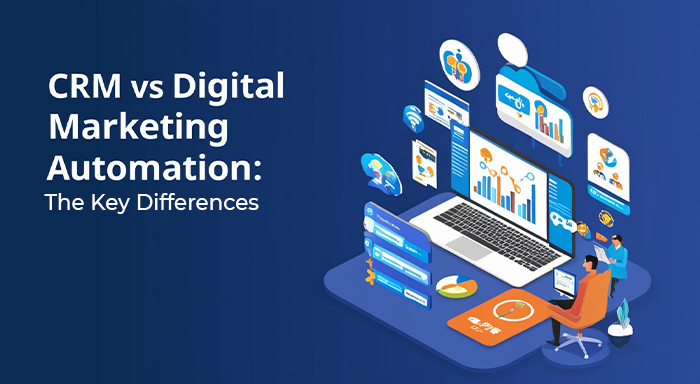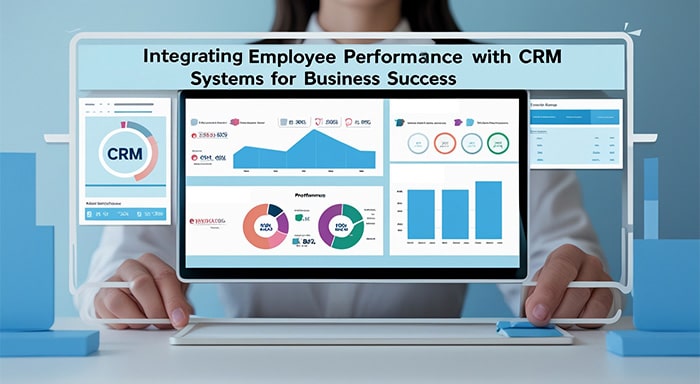It’s easy to confuse CRM and digital marketing automation tools for the uninitiated. After all, they both help you deal with customers, track metrics, and generally make your life easier.
But does your business need CRM? Digital marketing automation tools? Both or neither? In this article, we will explain what they are, the difference between CRM and marketing automation tools, and which tools your business needs.
What is CRM (Customer Relationship Management)?
Customer Relationship Management is referred to as CRM. Over the course of the customer lifecycle, these tools assist you in managing and analyzing customer contacts and behavior.CRMs are primarily designed to help you improve customer relations, expedite procedures, and eventually boost sales.
CRM systems excel at:
- Contact management. The bread and butter of any CRM is a centralized database for storing client information.
- Interaction tracking. A good CRM also records all customer communications and interactions.
- Sales pipeline management. They also have tools for tracking leads to never miss sales opportunities.
- Task management. Adjacent to it are task management functions that help you organize follow-ups and other actions with the customer.
- Reporting and analytics. No comprehensive CRM tool is complete without analytics functions to help you understand customer behavior and implement changes based on them.
These tools are used for different purposes by different professionals. For example, sales teams use CRM to track leads, manage pipelines, and forecast revenue, while customer service representatives access customer history to provide personalized support. Managers can utilize CRMs to analyze team performance.
What are Digital Marketing Automation Tools?
Unlike CRMs, digital marketing automation tools can have wildly different functions.The only thing they have in common is their ability to support your marketing efforts. Tools like Mailchimp allow you to automate your email campaigns, Adsy offers you to quickly buy backlinks in bulk from vetted publishers, while comprehensive tools like HubSpot have a suite of various automation.
To design and oversee multi-channel marketing initiatives, marketers employ automation. Automation is used by content teams to track engagement and distribute material. Marketing managers utilize automation data to optimize marketing strategies and allocate resources.
These are just the most widespread uses. However, as there are so many different tools, other experts can use them for different purposes.
CRM vs. Marketing Automation: Key Differences
As you can see, even the best marketing automation and CRM tools have their principal differences. Let’s look at their distinctive features and compare them.
Primary Focus
CRM tools primarily focus on managing customer data and building good relations between a customer and your business. In order to provide individualized experiences and retain a positive reputation, it acts as a central repository for all of your customers' information.
On the other hand, marketing automation platforms are laser-focused on helping you execute your marketing campaigns. Their main draw is streamlined, efficient, and scalable marketing processes — from lead generation to conversion.
Main Users
As sales and customer service teams work more directly with customers, they are the primary user base of CRM platforms. Their work is greatly facilitated by having all of the consumer data at their fingertips, which enables them to provide even more individualized experiences for their clientele.
Marketing teams rarely work with customers directly and instead use automation tools to improve the efficiency of their processes. Sending out emails, generating landing pages, scoring leads, and more are all vital for keeping the marketing department agile and flexible.
Data Handling
CRM’s entire purpose is to handle the detailed data of thousands of customers. It’s easy to pull up contact details, interaction and purchase history, preferences, and other info about any customer. This granularity follows the main purpose of offering highly personalized experiences.
Marketing automation and CRM tools are quite similar in this regard, but the former offers groups and segments of customers instead of offering individual data about every client. This allows marketing professionals to create generalized customer profiles to better appeal to your target audience.
Communication Approach
CRM platforms help your team communicate with customers on a one-to-one basis. With the help of their technologies, sales and support teams can interact with clients in a way that is specific to their profiles.
On the other hand, automation tools help your marketing department communicate on a one-to-many basis via emails, social media, etc. While there is still personalization, it’s way less granular, as it’s based on group profiles rather than individual ones, allowing you to easily scale communications to an unlimited number of clients.
Lifecycle Focus
Customer support and sales specialists have to contact clients throughout their entire customer lifecycle, from awareness to post-sale support and repeat purchases. CRM systems help them track the entire journey.
Digital marketers are only concerned with customer acquisition, so their automation systems only emphasize lead generation, nurturing, and conversion stages. Some platforms offer customer retention features, but they’re usually a tack-on.
Price Comparison
While every service has its own costs, it’s possible to do a basic price comparison of most CRM vs. marketing automation tools.
- Basic CRM systems can start as low as $10–$20 per user per month, while more advanced enterprise solutions can cost hundreds of dollars per user per month.
- Marketing automation tools often start around $200-300 per month for small businesses and can scale up to thousands per month for larger organizations or more advanced features.
- All-in-one platforms that combine CRM and marketing automation features typically have higher starting prices but may offer better value if you need both functionalities.
Integration of Marketing Automation and CRM Tools
While there is a certain overlap of functions of marketing automation and CRM tools, they can consolidate data and pull from the same online databases when integrated correctly. Depending on your needs, using both can be the answer for maximized personalization.
Integrating automation and CRM has a number of advantages:
- Unified customer profiles. Integrating CRM and marketing automation provides a comprehensive view of the customer’s interactions, preferences, contact data, and other info.
- Enhanced lead nurturing. Marketing automation can feed qualified leads directly into the CRM, allowing sales teams to follow up more effectively.
- Improved personalization. Marketers can use CRM data to improve their campaigns with more targeted and relevant messaging.
- Closed-loop reporting. Integration allows for more accurate tracking of marketing ROI by connecting marketing activities to real sales.
- Streamlined workflows. Automated data sharing between systems reduces manual data entry and improves overall efficiency.
Most enterprise-grade tools, as well as some smaller players, offer the functionality of CRMs, marketing automation tools, and more functions like document management. Others have native integrations with popular platforms on the market.
However, if your tools don’t have that, you can always do some IT black magic and force them to work. It’s going to cost you more and probably work worse than time-proven integrations, but sometimes, you have to make do with what you have.
Choosing the Right Tool
Understanding whether you need a comprehensive CRM tool, automation software for better backlinks, or both isn’t always straightforward. Let’s look at some factors you might need to consider before taking your pick.
- Business size and complexity. If you own a large business with complex sales cycles, a CRM system is likely the choice for you. However, smaller businesses can make do with marketing automation, prioritizing growth before retention.
- Primary objectives. It’s quite self-explanatory, but if your main goal is to manage customer relationships and improve sales processes, a CRM will be more suitable. If lead generation and nurturing are what you’re after, marketing automation will pull ahead.
- Team structure. Consider which teams are more important for your business or are generally more loaded. If your sales team does most of the work, a CRM will be the right choice, but if your company is more marketing-driven, go with automation tools all the way.
- Budget and resources. Evaluate the costs associated with implementation, training, and ongoing maintenance for each type of system. As we discussed before, CRM tools are generally a more budget-friendly option, although there are some outliers.
- Integration capabilities. If you already have some tools in place or plan on using more in the future, look at what other tools they can be integrated with.
If you’re still not sure what to choose, you might actually need both marketing automation and CRM platforms or a comprehensive suite that offers integrated functionalities. Consider using both platforms if you are a:
- Growing mid-sized company. As you start to scale, you might find value in both paying more attention to customer relationships and automating your marketing.
- B2B company with long sales cycles. You can benefit from marketing automation for lead nurturing and CRM for managing complex sales processes.
- E-commerce business. You can use marketing automation for customer acquisition and CRM for order management and customer support.
Conclusion
The relationship between CRM and marketing automation tools is symbiotic, so it makes sense for many businesses to consider using both as they are powerful allies in enhancing customer relationships and marketing.
The choice between CRM, marketing automation, or both ultimately depends on your business's needs, size, and objectives.
Remember, the goal isn't just to adopt new technologies for the sake of adoption or fashion but to use them to improve your customer interactions, streamline your operations, and fuel sustainable growth.
Related Post:








